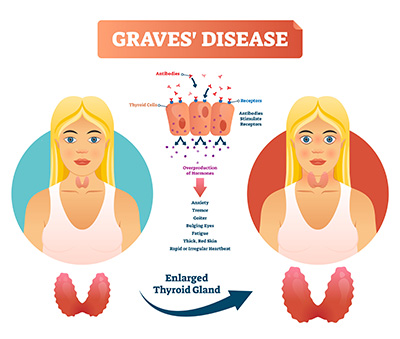
Medical science hasn’t unraveled the precise cause of Graves’ Disease, but the fact that it tends to run in families suggests this disease may have a genetic component. If you’re experiencing unexplained weight loss, nervousness, shaky hands, problems sleeping or a heartbeat that is fast or irregular, it could mean you have a hyperthyroid condition (too much thyroid hormone). Determining whether Graves’ Disease is at the root is key.
Some of the symptoms of Graves’ Disease can have dire complications. Irregular heartbeat, for example, can lead to blood clots, stroke, heart failure, and other heart-related issues. Available treatments – ranging from lifestyle modifications to thyroid medication or radioactive iodine therapy – can be used to restore normal function of your immune system and thyroid gland.
You don’t have to struggle with the symptoms of Graves’ Disease. Treatment is available and effective. To schedule a consultation with Water’s Edge Natural Medicine, complete the form below or call us at (206) 966-4522 today!
Graves’ Disease is a disorder of the immune system that impacts the thyroid gland - also known as an autoimmune disease. The autoimmune response triggers the overproduction of thyroid hormones (hyperthyroidism). While other diseases can also lead to hyperthyroidism, Graves’ Disease is one of the most common. Learn more about thyroid disease and autoimmune disease and our approach at Water’s Edge Natural Medicine.
If you have Graves’ Disease, it is because your immune system is making an antibody called thyroid-stimulating immunoglobulin (TSI) that is attaching to your thyroid cells and causing your thyroid to make too much thyroid hormone – leading to hyperthyroidism. TSI behaves much like thyroid-stimulating hormone (TSH), the hormone made naturally in your pituitary gland that tells your thyroid how much thyroid hormone to make. Researchers are unclear on why this autoimmune malfunction occurs in some people, but it is theorized that there is both a genetic factor involved as well as a triggering event, like a virus.
Thyroid hormones affect many body systems, so signs and symptoms of Graves’ Disease can be wide ranging, and each individual may experience a different array or combination of symptoms. Common symptoms can include weight loss that is unexplained and unintended, as well as fatigue, muscle weakness, and abnormal heat intolerance.
Other symptoms may include:
Eyeballs that bulge from their sockets – otherwise known as Graves’ Ophthalmopathy (GO) or Thyroid Eye Disease (TED) can be a symptom as well. From a quarter to over a third of patients with Graves’ Disease are estimated to develop this eye disease at some point in the disease process. TED is considered a unique disease on its own. Though it is usually associated with Graves’ Disease, it can occur, albeit rarely, in patients with normal or low thyroid function. When the immune system attacks the muscles and tissues surrounding the eyes, the following symptoms usually occur:
Understanding your specific symptoms during the diagnosis stage of your treatment at Water’s Edge Natural Medicine is an essential part of diagnosing and treating your condition.
Our goal is to diagnose and treat what is causing the hormonal imbalance that is at the root of Graves’ Disease symptoms. Sometimes hormone irregularities signal the presence of illness or disease. That is why a thorough diagnostic process is so important when treating thyroid hormonal imbalance.
We recommend that you prepare a list of symptoms prior to your first consultation. At your initial consultation, we will take a complete medical history and perform a physical exam, which will include a comprehensive assessment of your symptoms. To properly diagnose Graves’ Disease, we may require specific types of hormone testing. We may also need to administer additional medical tests to rule out other conditions with similar symptom profiles.
To confirm a diagnosis of Graves’ Disease, we may order one or more thyroid tests, including blood tests that measure thyroid hormones and check for the presence of TSI, as well as a radioactive iodine uptake test to measure how much iodine your thyroid is utilizing to manufacture thyroid hormones. Generally, with Graves’ Disease, your thyroid is taking up large amounts of iodine. A Doppler ultrasound may also be helpful – especially if you are pregnant or breastfeeding and the radioactive iodine uptake test is not an option for you.
A thyroid scan is sometimes necessary to differentiate other causes of hyperthyroidism by showing where and how iodine is distributed in your thyroid.
At Water’s Edge Natural Medicine in Seattle, WA, we understand that your diagnosis is the first step in balancing your thyroid hormones and restoring your thyroid health.
Addressing thyroid hormone irregularities, together with an autoimmune disease condition like we see in Graves’ Disease, requires experience and an understanding of autoimmune and thyroid conditions.
Conventional treatments used to treat Graves’ Disease range from anti-thyroid drugs to radioactive iodine therapy, and in the most extreme cases, thyroidectomy surgery. There are many interventions that can restore normal thyroid function and enable many patients with Graves’ Disease to achieve remission. In some cases, treatment may be targeted to symptoms – especially alarming symptoms like high blood pressure and irregular heartbeat that require immediate intervention, depending on severity.
Since Graves’ Disease symptoms manifest differently in each individual, the course of treatment will vary with each individual patient. After comprehensive thyroid hormone testing, some of our treatment options may include:
Thyroid hormones are complex and working with a doctor who understands the complexity of Graves’ Disease is very important. At Water’s Edge Natural Medicine in Seattle, WA, we offer the most up-to-date treatment for Graves’ Disease so you can get back to baseline and beyond.
If you are struggling with the symptoms of Graves’ Disease and have questions, we invite you to reach out to us. We are here to answer any questions you may have about your symptoms and our methods to restore thyroid balance and bring you back to health and overall wellness.
Compile your list of symptoms, and call Water’s Edge Natural Medicine in Seattle, WA at (206) 966-4522 or contact us online.